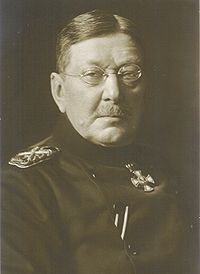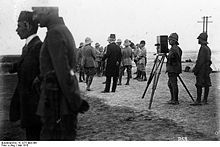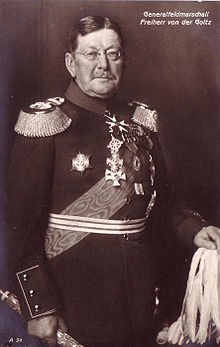- Colmar Freiherr von der Goltz
-
Colmar von der Goltz 
Colmar von der GoltzBorn 12 August 1843
Bielkenfeld, PrussiaDied 19 April 1916 (aged 72)
Baghdad, Ottoman EmpireAllegiance  Prussia
Prussia
 German Empire
German Empire
 Ottoman Empire
Ottoman EmpireService/branch Prussian Army Years of service 1861-1911
1914-1916Rank Generalfeldmarschall
PashaBattles/wars Austro-Prussian War
Franco-Prussian War
World War IWilhelm Leopold Colmar Freiherr von der Goltz (12 August 1843 – 19 April 1916) also known as Goltz Pasha, was a Prussian Field Marshal and military writer.[1]
Contents
Military career
Goltz was born in Bielkenfeld, East Prussia (later renamed Goltzhausen; now Ivanovka, near Polessk, Kaliningrad Oblast),[2] into an impoverished noble family. He grew up at the manor house of Fabiansfelde near Preußisch Eylau, which had been bought by his father in 1844.[3] His father spent some nineteen years in the Prussian Army without rising above the rank of lieutenant, and his efforts at farming were similarly unfruitful, and he eventually succumbed to cholera while on a trip to Danzig (now Gdańsk) when Colmar was six years old.[4]
Goltz entered the Prussian infantry in 1861 as a second lieutenant with the 5th East Prussian Infantry Regiment Number 41, in Königsberg (now Kaliningrad).[5] During 1864 he was on border duty at Thorn (Toruń), after which he entered the Berlin Military Academy, but was temporarily withdrawn in 1866 to serve in the Austro-Prussian War, in which he was wounded at Trautenau. In 1867 he joined the topographical section of the general staff, and at the beginning of the Franco-Prussian War of 1870-71 was attached to the staff of Prince Frederick Charles, commanding general of the Prussian Second Army. He took part in the battles of Vionville and Gravelotte and in the siege of Metz. After its fall he served under the Red Prince in the campaign of the Loire, including the battles of Orleans and Le Mans.
Goltz was appointed professor at the military school at Potsdam in 1871, promoted to captain, and placed in the historical section of the general staff. It was then that he wrote Die Operationen der II. Armee bis zur Capitulation von Metz (The Operations of the Second Army until the surrender of Metz) and Die Sieben Tage von Le Mans (The Seven Days of Le Mans), both published in 1873. In 1874 he was appointed first general staff officer (Ia) of the 6th Division, and while so employed wrote Die Operationen der II. Armee an der Loire (The Operations of the Second Army on the Loire) and Léon Gambetta und seine Armeen (Léon Gambetta and his armies), published in 1875 and 1877 respectively. The latter was translated into French the same year, and is considered by many historians to be his most original contribution to military literature.
Goltz stressed how, despite the rapid initial victory against the Imperial French forces at Sedan, the new French Republic had been able to mobilise national will for a Volkskrieg ("War of the People") which dragged on for many more months (the Siege of Paris, the campaign on the Loire and the partisans behind German lines, the latter tying down 20% of German strength), the implication being that it was therefore unrealistic to expect a quick victory over France in any future war. The views expressed in the latter work were unpopular with the powers that be and led to Goltz's being sent back to regimental duty for a time, but it was not long before he returned to the military history section. In 1878 Goltz was appointed lecturer in military history at the military academy at Berlin, where he remained for five years and attained the rank of major. He published, in 1883, Roßbach und Jena (new and revised edition, Von Rossbach bis Jena und Auerstadt, 1906), Das Volk in Waffen (The Nation in Arms), both of which quickly became military classics, and during his residence in Berlin contributed many articles to the military journals.
Service with the Ottoman Empire
After defeat in the Russo-Turkish War (1877-1878), Sultan Hamid, ruler of the Ottoman Empire, asked for German aid in reorganizing the Ottoman Army, so that they would be able to resist the advance of the Russian Empire. Baron von der Goltz was sent. He spent twelve years on this work which provided the material for several of his books. After some years he was given the title Pasha (a signal honor for a non-Muslim) and in 1895, just before he returned to Germany, he was named Mushir (field-marshal). His improvements to the Ottoman army were significant and the Turkish army stopped at the gates of Athens in the Greco-Turkish War (1897), only when the Czar Nicholas II of Russia threatened the Ottoman Sultan that he would be attacking the Ottoman Empire from eastern Anatolia, unless the Ottoman Army stopped the campaign.
On his return to Germany in 1896 Goltz became a lieutenant-general and commander of the 5th division, and in 1898, head of the Engineer and Pioneer Corps and inspector-general of fortifications. In 1900 he was made general of infantry and in 1902 commander of the I. army corps. In 1907 he was made inspector-general of the newly created sixth army inspection established at Berlin, and in 1908 was given the rank of colonel-general (Generaloberst). Following the 1911 manœuvres Goltz was promoted to Generalfeldmarschall (Field Marshal), and retired from active service. In 1911 he founded the Jungdeutschlandbund (Young German League), an umbrella organization of right wing German youth associations.
Recalled from retirement: World War I
In German service (1914–1915)
At the outbreak of the First World War Goltz was recalled to duty and appointed the military governor of Belgium. In that position, he dealt ruthlessly with what remained of Belgian resistance to German occupation, mostly sniper-fire and damaging rail and telegraph lines. As Martin Gilbert notes in The First World War, in early September 1914, the newly appointed Goltz proclaimed: "It is the stern necessity of war that the punishment for hostile acts falls not only on the guilty, but on the innocent as well." On 5 October, he was even clearer when he ordered: "In the future, villages in the vicinity of places where railway and telegraph lines are destroyed will be punished without pity (whether they are guilty or not of the acts in question). With this in view hostages have been taken in all villages near the railway lines which are threatened by such attacks. Upon the first attempt to destroy lines of railway, telegraph or telephone, they will immediately be shot."
Goltz' actions were praised by Adolf Hitler, who in September 1941 linked Nazi atrocities in Eastern Europe with those in Belgium during World War I.
“ The old Reich knew already how to act with firmness in the occupied areas. That's how attempts at sabotage to the railways in Belgium were punished by Count von der Goltz. He had all the villages burnt within a radius of several kilometres, after having had all the mayors shot, the men imprisoned and the women and children evacuated.[6] ” In Ottoman service (1915-1916)
Soon afterward Goltz gave up that position and became a military aide to the (essentially powerless) Sultan Mehmed V. Baron von der Goltz did not get along with the head of the German mission to Turkey, Otto Liman von Sanders, nor was he liked by the real power in the Ottoman Government, Enver Pasha.
Despite the mutual dislike, in mid-October 1915, with the British under General Townshend advancing on Baghdad, Enver Pasha put Goltz in charge of the Fifth Army (see the Mesopotamian Campaign). Baron von der Goltz was in command at the Battle of Ctesiphon - which was a draw, as both sides retreated from the battlefield. However, with the British retreating, Goltz turned his army around and followed them down the river. When Townshend halted at Kut, Goltz laid siege to the British position (see the Siege of Kut). Much like Julius Caesar's legions at the Battle of Alesia, the Turkish 6th Army under the command of Halil Kut Pasha had to fight off a major British effort to relieve the Kut garrison while maintaining the siege. All told the British tried three different attacks and each one failed at a total cost of 23,000 casualties. The battles included The Battle of Wadi, The Battle of Hanna and the Battle of Dujaila.
Armenian Genocide
During the 1915 campaign of the Russians in eastern Anatolia, German officers had recommended the selected deportation of local Armenian population in Eastern Anatolia, in case the Russian advance caused an uprising. When Enver Pasha showed such orders to Goltz he approved of them as a military necessity. In the words of one historian, "Goltz's later actions to stop deportations indicate it is unlikely that he understood its larger significance."[7] In December 1915 Goltz directly intervened, threatening to resign his command if the deportations were not halted. It was a measure of Goltz's stature in the Ottoman Empire that he, as a foreign military officer, was able, if briefly, to influence domestic policy. However, he was able to effect only a temporary reprieve, and then only in Mesopotamia. It would have been almost unheard of for a soldier to resign during wartime, and in the end Goltz did not do so.[8]
Death
 Ras el-Ain (Syria), near the Euphrates river (then the end of the Baghdad Railway), May 1916: German officers of the Special Palestine Mission are waiting for the arrival of the coffin of Goltz-Pasha
Ras el-Ain (Syria), near the Euphrates river (then the end of the Baghdad Railway), May 1916: German officers of the Special Palestine Mission are waiting for the arrival of the coffin of Goltz-Pasha
Goltz died on 19 April 1916, in Baghdad, just two weeks before the British in Kut surrendered. The official reason for his death was typhus, although apparently there were rumors that he had been poisoned by the Turks.[9] In accordance with his will, he was buried in the grounds of the German Consulate in Tarabya, Istanbul, overlooking the Bosporus.
Writing career
From the 1870s until World War I, Baron von der Goltz was more widely read by British and American military leaders than Clausewitz. In addition to many contributions to military periodicals, he wrote Kriegführung (1895), later titled Krieg und Heerführung, 1901 (The Conduct of War); Der Thessalische Krieg (The War in Greece, 1898); Ein Ausflug nach Macedonien (1894) (A Journey through Macedonia); Anatolische Ausflüge (1896) (Anatolian Travels); a map and description of the environs of Constantinople; Von Jena bis Pr. Eylau (1907) (From Jena to Eylau).
See also
- Sigismund von Schlichting
- Julius von Verdy du Vernois
- Bund der Asienkämpfer
Notes
- ^ Regarding personal names: Freiherr is a title, translated as Baron, not a first or middle name. The female forms are Freifrau and Freiin.
- ^ Google Maps at maps.google.com
- ^ Horst Schulz, Der Kreis Pr. Eylau, Verden/Aller 1983
- ^ Hermann Teske (1957), 9-10
- ^ Hermann Teske (1957), 14
- ^ Hitler, Adolf (1953). Hitler's Secret Conversations. New York: Farrar, Straus and Young. pp. 25.
- ^ Isabel V. Hull (2005), 276-277
- ^ Isabel V. Hull (2005), 286-287
- ^ Barker, A. J., The First Iraq War: 1914-1918, Britain's Mesopotamian Campaign (Enigma Books, 2009), 228
References
- Teske, Hermann (1957). Colmar Freiherr von der Goltz: Ein Kämpfer für den militärischen Fortschritt. Berlin: Musterschmidt-Verlag.
- Hull, Isabel (2005). Absolute Destruction: Military Culture and the Practices of War in Imperial Germany. Cornell: Cornell University Press.
- Barker, A. J. (2009). The First Iraq War, 1914-1918: Britain's Mesopotamian Campaign. New York: Enigma Books. ISBN 978-1-929631-86-5
 This article incorporates text from a publication now in the public domain: Chisholm, Hugh, ed (1911). "Goltz, Colmar, Freiherr von der". Encyclopædia Britannica (11th ed.). Cambridge University Press.
This article incorporates text from a publication now in the public domain: Chisholm, Hugh, ed (1911). "Goltz, Colmar, Freiherr von der". Encyclopædia Britannica (11th ed.). Cambridge University Press.
Partial list of works
- Feldzug 1870-71. Die Operationen der II. Armee. Berlin, 1873.
- Angeline. Stuttgart, 1877.
- Leon Gambetta und seine Armee. Berlin, 1877.
- Rossbach und Jena. Studien über die Zustände und das geistige Leben der preußischen Armee während der Uebergangszeit von XVIII. zum XIX. Jahrhundert. Berlin, 1883.
- Das Volk in Waffen, ein Buch über Heerwesen und Kriegführung unserer Zeit. Berlin, 1883.
- Ein Ausflug nach Macedonien. Berlin, 1894.
- Kriegführung. Kurze Lehre ihrer wichtigsten Grundsätze und Formen. Berlin, 1895.
- Anatolische Ausflüge, Reisebilder von Colmar Freiherr v. d. Goltz; mit 37 Bildern und 18 Karten. Berlin, 1896.
- Krieg- und Heerführung. Berlin, 1901.
- Von Rossbach bis Jena und Auerstedt; ein Beitrag zur Geschichte des preussischen Heeres. Berlin, 1906.
- Von Jena bis Pr. Eylau, des alten preussischen Heeres Schmach und Ehrenrettung; eine kriegsgeschichtliche Studie von Colmar Frhr. v. d. Goltz. Berlin, 1907.
- Jung-Deutschland; ein Beitrag zur Frage der Jugendpflege. Berlin, 1911.
- Kriegsgeschichte Deutschlands im neunzehnten Jahrhundert. Berlin, 1910-1912.
- 1813; Blücher und Bonaparte, von Feldmarschall Frhn. v. d. Goltz.. Stuttgart and Berlin, 1913.
External links
Categories:- 1843 births
- 1916 deaths
- German military writers
- German nobility
- Pashas
- German military personnel of World War I
- Ottoman military personnel of World War I
- Field Marshals of the German Empire
- Field Marshals of Prussia
- Field Marshals of the Ottoman Empire
- Military historians
- German military historians
- People from the Province of Prussia
- Deaths from typhus
Wikimedia Foundation. 2010.

